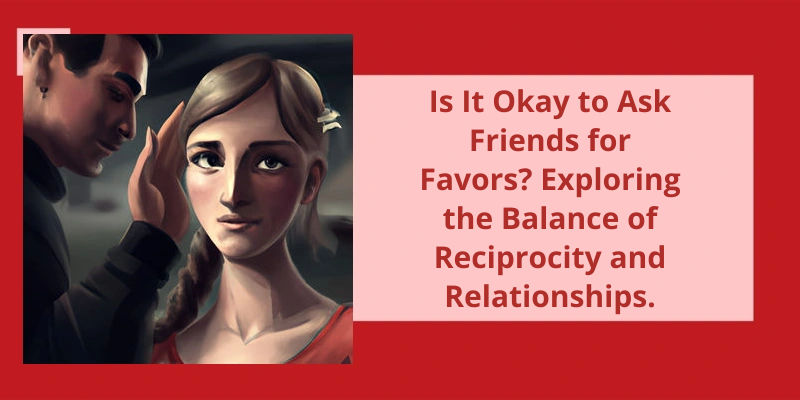But despite the apprehension that may come with asking for help, it's important to recognize that often friends and loved ones want to be there for us and support us in any way they can. The key is in finding the right balance between respecting their boundaries and genuinely needing their assistance. In a world where we're often encouraged to be self-sufficient and independent, it can be challenging to admit when we need help. However, reaching out and expressing our needs can’t only strengthen our relationships but also provide us with the support and resources we need to achieve our goals. So, is it okay to ask friends for favors? Absolutely – as long as it's done with sincerity, consideration, and respect.
When a Friend Constantly Asks for Favors?
From there, you can set boundaries that are reasonable for both parties. If your friend asks for favors too often, you may need to take a break from spending time together or limit the favors you do for them. This doesn’t mean that you can’t be friends, but rather that you need to prioritize your own well-being and time.
In some cases, your friend may be going through a tough time and may genuinely need your help. However, if this pattern continues, it’s important to evaluate whether or not the friendship is mutually beneficial. It isn’t selfish to prioritize your own needs and to set boundaries. A healthy friendship should involve give and take, not constant one-sided requests for favors.
You may say something like, “I’m happy to help you out when I can, but lately it feels like I’m constantly being asked to do things for you. It’s starting to feel overwhelming and I need to balance my own needs too.”
Keep in mind that setting boundaries may be uncomfortable, but it’s necessary in order to maintain a healthy relationship. If your friend is truly a good friend, they’ll respect your boundaries and appreciate your honesty. If they do not, it may be a sign that they aren’t as committed to the friendship as you are.
Lastly, remember that it’s okay to say no. Your time and energy are valuable, and you’ve the right to prioritize your needs. Saying no to a friend’s request for a favor doesn’t make you a bad friend. In fact, it can be a sign of a healthy boundary and a commitment to your own well-being.
Remember to prioritize your own needs and to communicate your concerns in a respectful and honest manner. If the friendship is meant to be, it will survive this challenge and become even stronger over time.
Strategies for Saying No to a Friend’s Overwhelming Requests
- Explain your situation: If you can’t do what your friend is requesting of you, try to explain your situation to your friend. For example, you may be too busy with work or family commitments to take on any additional tasks.
- Suggest alternatives: If you’re unable to help your friend with what they’re requesting, suggest alternatives that may be more feasible for you. For example, if your friend needs help moving but you aren’t available on the day they need help, suggest a different day or recommend hiring a professional moving company.
- Be honest: It’s important to be honest with your friend about your limitations and what you’re capable of doing. If you can’t help them, it’s better to be upfront and honest about it rather than overcommitting and not being able to follow through.
- Set boundaries: If your friend is constantly making overwhelming requests of you, it may be time to set boundaries and let them know what you’re comfortable with. Let them know what you’re able to help with and what you aren’t comfortable doing.
- Offer support in other ways: If you’re unable to help your friend with their request, offer support in other ways. You can offer to listen to them, provide emotional support, or suggest other resources that may be helpful.
However, it’s important to recognize that asking for a favor is a normal part of human interaction and doesn’t necessarily indicate weakness or dependency. In fact, reasonable requests can strengthen relationships and help both parties achieve their goals. So, what’s the key to making a successful request without coming across as needy or imposing? Let’s explore some tips and tricks for asking for favors in a mindful and respectful way.
Is It Okay to Ask Someone for a Favor?
Many people struggle with the idea of asking for favors because they feel like they’re imposing on others. They worry that they’ll be seen as needy or that they’ll put their relationships at risk. However, asking for a favor is a normal part of human interaction and can actually strengthen relationships when done correctly.
One important thing to keep in mind when asking for a favor is to be clear about what you need and why you’re asking. People are more likely to say yes to a request when they understand the reasoning behind it and feel like their help will make a difference. It’s also important to show gratitude for any help that you do receive, and to be willing to reciprocate when the opportunity arises.
If the favor is particularly large or time-consuming, it’s important to acknowledge that and to be respectful of any limits that the other person may have. Similarly, if the person seems hesitant or unsure about fulfilling your request, it’s important to respect their decision and not to pressure them into doing something that they arent comfortable with.
If asking for a particular favor feels uncomfortable or inappropriate, it’s important to trust your instincts and either find a different way to get the help you need or to simply move on.
To make sure that your requests are received positively, it’s important to be clear about what you need, to show gratitude for any help you receive, and to be mindful of the other persons time and energy.
Different Situations Where It Is Appropriate or Inappropriate to Ask for a Favor, Such as in a Professional Setting or With Friends/Family
Asking for a favor can vary in appropriateness based on the situation. In a professional setting, it’s important to ensure that the request isn’t disrupting work duties or causing inconvenience to colleagues. On the other hand, with friends and family, it may be more appropriate to ask for a favor, but it’s still important to be respectful of their time and capabilities. Overall, it’s important to consider the circumstances and the impact of the favor being asked before making any requests.
When it comes to asking for favors, using polite expressions can go a long way in ensuring that the request is received well. While there are many ways to ask for a favor, here are 5 polite expressions that can help you make your request in a courteous manner.
What Is Another Way to Ask for a Favor?
There are various situations in which we need to ask for a favor or request something from another person. This could be at work, with friends or family, or even with a stranger. However, it’s important to be polite and respectful when doing so, as it shows that we value the other person’s time and effort. One way to achieve this is by using polite expressions when making requests.
One common way to ask for a favor is by using the phrase “I was wondering if…” followed by the request. This phrase is often used when we’re unsure if the other person is able or willing to help us, and allows them to decline the request without feeling pressured. For example, “I was wondering if you could lend me a hand with this project?”
Another polite request is to use the phrase “I was hoping…” followed by the request. This expresses a sense of optimism and positivity, and can make the other person more inclined to help us. For example, “I was hoping you could give me some advice on this matter.”
When we’re unsure if the other person is able to fulfill our request, a useful phrase is “Do you think you/I/we could?” followed by the request. This allows for a discussion of the feasibility of the request, and shows that we’re flexible and willing to compromise. For example, “Do you think we could reschedule our meeting for later in the day?”
Another way to frame a request politely is to use the phrase “Would it be possible to…” followed by the request. This highlights the importance of the request and shows that we understand that the other person may have other commitments or priorities. For example, “Would it be possible to borrow your car for a few hours this weekend?”
Finally, we can use the phrase “Would it be a problem if…” followed by the request. This allows for an open discussion of any potential issues or concerns, and shows that we’re respectful of the other person’s boundaries and preferences. For example, “Would it be a problem if I asked you to keep the noise down later tonight?”
Using these five phrases can make our requests sound more polite and less demanding, and help to build positive relationships with others.
How to Follow Up After a Favor Has Been Granted
When someone does you a favor, it’s important to show gratitude and follow up to maintain the relationship. Sending a thank-you note or email expressing your appreciation is a simple way to express your gratitude. Additionally, it’s important to check in with the individual periodically, asking how they’re doing and if there’s anything you can do to reciprocate the favor. By doing so, you can keep the relationship alive and show that you value their help.
Understanding the distinction between a request and a favor is important as it can help to set clear expectations and avoid miscommunication. While all favors are requests, not all requests necessarily involve asking for a favor. In the following sections, we’ll explore the nuances of requesting and favor-asking in various settings.
What Is the Difference Between a Request and a Favor?
However, “can you please pass the salt?” is a request but not necessarily a favour, as it’s a common polite request that doesn’t necessarily require goodwill or special effort from the person asked.
The main difference between a request and a favour is that a request is often more neutral and can be made in a variety of contexts, while a favour implies a certain level of relationship or social obligation. Asking for a favour can be seen as putting the person youre asking in a position of power over you, as they’ve the option to grant or deny your request. Therefore, it’s often important to approach asking for a favour with tact and appreciation.
Additionally, a favour often involves some kind of personal sacrifice or effort on the part of the person asked. For example, asking someone to help you move furniture is definitely a favour, as it requires physical effort and time on their part. On the other hand, asking someone to borrow a pen is more of a simple request.
How to Ask for a Favor Tactfully and Appropriately
- Start with a polite greeting.
- Introduce yourself and explain the situation briefly.
- Be clear about what you need and why you need it.
- Show appreciation and offer something in return if possible.
- End with a polite request for their help.
- Thank them for their time and consideration.
Asking for a favor from someone can be difficult, especially in formal situations where proper etiquette must be observed. It’s essential to use the correct language and tone when making such a request to avoid offending or coming across as rude. This article will explore different ways to ask for a favor using the infinitive form of the verb to do. By the end, you’ll be equipped with the language skills you need to make a polite request in any formal setting.
How Do You Ask for a Favor in a Sentence?
Asking for a favor can be a delicate matter, especially in formal situations. One effective way to do it’s by using the infinitive form of the verb, adding a polite phrase and giving a clear explanation of what’s needed. For instance, if you need someone to help you move furniture, you could say “Would you be so kind as to help me move my furniture to my new apartment?”. The verb “to help” is in it’s infinitive form and the polite phrase “would you be so kind as” shows respect for the other person.
Instead of directly asking for what you need, you can phrase it as a question or a suggestion. For example, “Do you happen to know if theres a good mechanic in the area who can fix my car?”. If the other person knows of one, they might offer to help. Alternatively, you could say “Ive been having trouble finding a good mechanic in the area. Would you’ve any suggestions?”. This way, youre not directly asking for the favor, but youre still making your needs known.
It’s also important to be clear about the nature of the favor and what the other person can expect in return. If youre asking someone to do something that will take up a lot of their time or resources, it’s respectful to offer compensation or a way to reciprocate their help. For example, “I understand that this project is a big ask, but I’d really appreciate your help. If youre able to assist me, I’d be more than happy to compensate you for your time and expertise.”
When asking for a favor, it’s important to show gratitude. Be sure to thank the person for their time and consideration in advance, and offer your appreciation in any way you can. For instance, you could say something like “Thank you so much for taking the time to consider my request. I truly appreciate your help.”. A little gratitude can go a long way in making the other person feel appreciated and respected.
Finally, it’s important to be confident and direct in your request, while still using polite language. If you’re uncertain or hesitant in your language, the other person may not take your request seriously. Be clear about what you need, why you need it, and what the other person can expect in return. By following these tips, you can ask for a favor in a polite and respectful way, while still making your needs known.
Asking for a favor can sometimes be a daunting task, especially if you’re unsure of how to go about it. However, with a little bit of politeness and some tact, it’s possible to request help from someone without offending or inconveniencing them. In this article, we’ll explore some tips for politely asking for a favor, including how to ask in a formal email and ensuring you’re approaching the right person.
How Do You Politely Ask Someone for a Favor?
Asking someone for a favor can be a daunting task, especially if you don’t know the person you’re requesting the favor from. It’s crucial to approach the situation with politeness and respect. Ensure that the person you’re requesting the favor from has the capacity and willingness to help you.
Once you’ve identified the right person, it’s essential to focus on the recipient. Consider what this person may be interested in and tailor your request accordingly. You want to make sure that your request resonates with them personally and professionally.
Give the person enough time to respond to your request. Timing is everything, and it’s crucial to approach the person when they aren’t under pressure or in a rush. It’s also essential to address the recipient properly, using appropriate titles and formal language.
If you havent met the person before, it’s always polite to introduce yourself and state your reason for reaching out. This brief introduction shows that you’re courteous and professional.
When you’re ready to ask for the favor, do so politely. Dont make assumptions or demands. Instead, frame your request in a way that shows that you value the persons time and expertise. Remember, you’re asking for help, not demanding it.
Include all necessary details in your request. Be clear and concise about what you need and why you need it. If there are any specific requirements or limitations, be sure to mention them.
Finally, add a convincing argument for why the person should help you. Highlight any benefits or opportunities that may arise from supporting your request. It’s essential to show that you’re passionate and committed to your cause.
How to Follow Up After Asking for a Favor
When following up after asking for a favor, it’s important to be polite and considerate. Start by thanking the person for their time and effort, and then politely check in on the progress of the favor. If they haven’t had a chance to complete the favor yet, offer to provide any additional information or assistance they may need. Remember to be patient, as everyone has their own schedule and priorities.
Conclusion
However, it's important to remember that asking for help is a natural part of human interaction and we all need assistance at some point in our lives. Building strong relationships with friends often involves mutual support and asking for favors is simply a part of that. It's important to approach it with grace and consideration, being mindful of your friend's time and energy. As long as you're respectful, appreciative, and don't make a habit of constantly asking for favors, there's no harm in reaching out for help when you need it. In fact, it can actually strengthen your friendships and bring you closer together. So, if you need a little help from your friends, don't be afraid to ask, just remember to give as well as receive.






